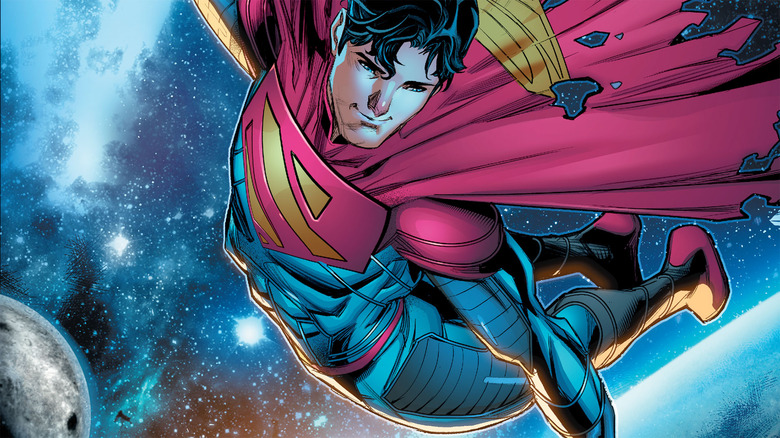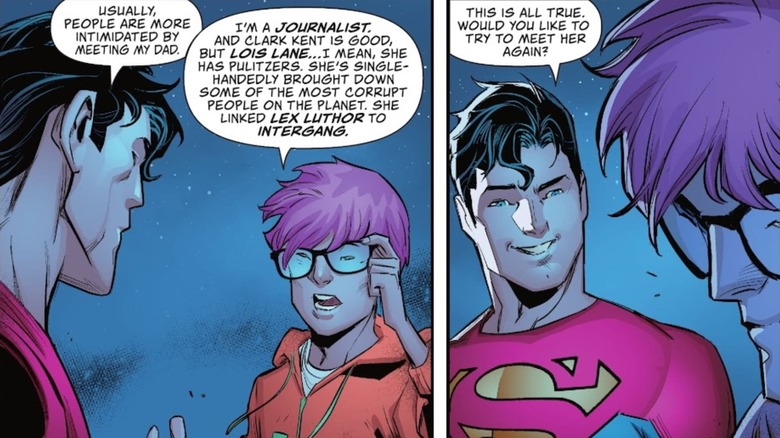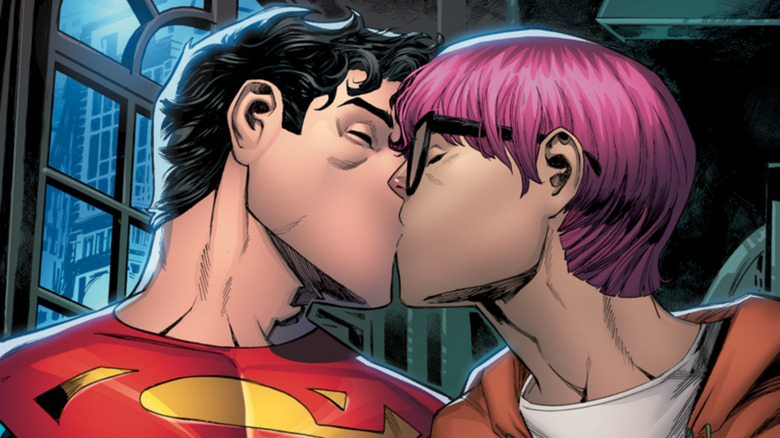The New Superman Is Bisexual, And Good For Him
Superman has long been a symbol of hope and strength, an extraterrestrial being of massive power who serves as an inspirational force across the universe. That "S" symbol will bring hope in a brand new way, with DC commemorating National Coming Out Day in the United States with the announcement that Jonathan Kent, the oldest son of Clark Kent and Lois Lane, will come out as bisexual in a forthcoming comic. The reveal will take place in "Superman: Son of Kal-El" #5, from writer Tom Taylor and artist John Timms, which will also see the young Man of Steel reveal his new love interest in reporter Jay Nakamura. In a statement from DC:
"Following a scene where Superman mentally and physically burns out from trying to save everyone that he can, Jay is there to care for the Man of Steel."
He's the third bisexual character revealed thus far connected to the central DC trinity of Superman, Wonder Woman, and Batman. Tim Drake, Batman's third Robin, also recently came out as bisexual in "Batman: Urban Legends" #6 (2021). Wonder Woman herself has regularly been written as bisexual, a prominent feature in Greg Rucka's run on the character. The reveal that Jonathan Kent, an important figure in one of the most powerful lineages in comic history, is bisexual is an important reveal for the character and a massive boost to bisexual representation in comics lore.
Jonathan Kent, Superman
The series "Superman: Son of Kal-El" has seen the powerful Jonathan Kent take on real-world crises like high school shootings, wildfires, and refugee crises. It's nowhere near the first DC run to force comic heroes to address real world ills (the famous 1970s "Green Lantern / Green Arrow" series saw the emerald archer go on an Earthbound journey with our planet's favorite space cop Hal Jordan) but it is a major moment for the representation of bisexual men in DC comic lore. Superman has long being one of the most powerful heroes of all time. With Kent being potentially more powerful than his father due to his hybrid DNA, it's a bold and welcome move for bi men beyond being major heroes' sidekicks (however important and skilled Tim Drake may be) and towards the canonical centrality among DC heroes that Wonder Woman shares.
"I've always said everyone needs heroes and everyone deserves to see themselves in their heroes and I'm very grateful DC and Warner Bros. share this idea," explained writer Tom Taylor. "Superman's symbol has always stood for hope, for truth and for justice. Today, that symbol represents something more. Today, more people can see themselves in the most powerful superhero in comics."
Beyond the importance of the representation in its own right, the arc will also allow Superman himself, easily among the most important heroes in comic history, key opportunities to demonstrate parental allyship, support, and care as key components of Superman's creed of "truth, justice, and the American Way."
Bi and LGBTQ heroes
While the need for greater representation in comics, films, and elsewhere is nowhere near complete, it's a great era for increasing LBGTQ+ representation in comic lore. Beyond the announcements of major heroes like Wonder Woman, Tim Drake, and Kent, the Young Justice hero Aqualad (aka Jackson Hyde) has also been revealed as gay. A number of Marvel heroes have also been announced as members of the LGBTQ+ family over the years. These include the powerful mutant Iceman, who came out as gay in "Uncanny X-Men" # 600, the famously pansexual Deadpool, Young Avengers characters Hulkling and Wiccan, Jessica Drew (Spider-Woman, Earth 1610), and the famous assassin Elektra. At the same time, with Wonder Woman and now Superman confirmed as joining the LGBTQ+ family, the power rankings, cultural, and canonical importance of the out DC heroes are monumental strides in comic representations of major heroes.
While it's easy for some to maybe overlook or underestimate the importance of LGBTQ+ representation expanding to these iconic cultural touchstones, it's not lost on those who haven't seen themselves positively and powerfully represented in film, television, literature, or so many other cultural avenues. As a bisexual man who grew up a Superman-reading comic fan decades ago, examples of such representation were few, far between, and often rendered to the side-kicks and minor characters. Seeing such a prominent and respected character would have had a major impact then (as it does now), and to witness representation expanding to the greatest heroes of all is a huge, and welcome, step forward.


